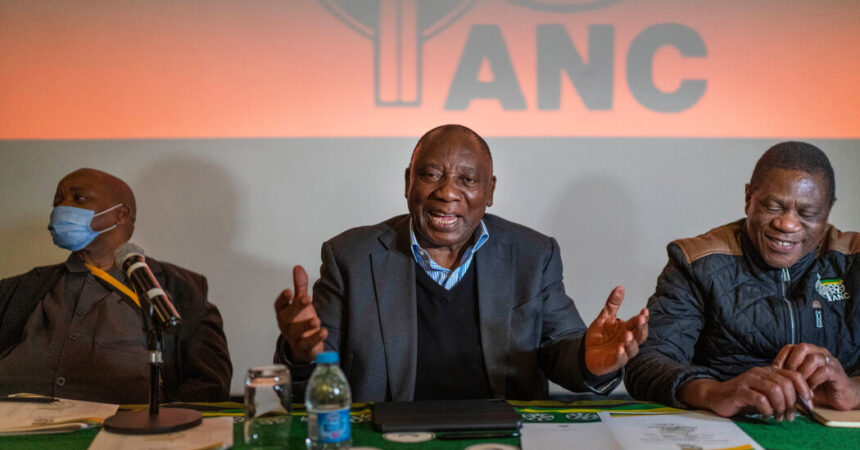Entering a new era of unpredictable politics, South Africa’s newly elected Parliament convened for the first time on Friday as lawmakers prepared to elect the country’s next president following last month’s national election.
The long-serving African National Congress, which failed to secure an absolute majority for the first time since coming to power after the end of apartheid, is expected to form a delicate alliance with rival parties, clearing the way for Cyril Ramaphosa to be elected. president for a second term.
But the two weeks since the election have been marked by tumultuous talks between the ANC, which Mr Ramaphosa leads, and rival political parties.
The process has exposed deep fissures within the ANC and in wider society, and in a notable development, Parliament opened without any formal announcement of a coalition agreement.
The president’s party has ruled with a comfortable majority since the end of apartheid in 1994. But its popularity has declined and it received only 40 percent of the vote in the latest elections, reflecting the great discontent of the continental powerhouse struggling with economic stagnation, high. unemployment and poverty.
After losing its dominance in Parliament, the ANC joined various parties that won seats in the National Assembly, seeking to create what it called a government of national unity that would give all parties a role in governing.
The ANC has sought to allay South Africans’ fears that the absence of a single dominant party at the national level for the first time in the democratic era would lead to political chaos, resulting in municipalities under shared leadership.
“The fundamental question is how we move forward in South Africa,” said Fikile Mbalula, one of the ANC’s top officials, on the eve of the first sitting of the newly elected Parliament. “The majority of political parties in our country believe that this time requires cooperation.”
But before 400 members of Parliament gathered at a convention center on the Atlantic coast of Cape Town on Friday, a clear divide had opened up in the new political landscape.
The election surprise party, uMkhonto weSizwe, led by former president and ANC leader Jacob Zuma, boycotted the opening of Parliament after winning 58 seats, the third most of any party.
The party, known as MK, performed better than the party in the first year of the democratic era. But Mr. Zuma has claimed, without providing evidence, that the election was rigged and the party won far more than nearly 15 percent of the electoral commission said it received.
MK has demanded that Mr Ramaphosa, who was Mr Zuma’s deputy before the two sides fell foul of each other, step down if the ANC wants to join the ruling coalition. ANC officials described the request as a nonstarter.
The Economic Freedom Fighters, the fourth largest party – which also has its roots as a breakaway group from the ANC – also appeared to reject calls for a unity government.
The party’s leader, Julius Malema, who was the ANC’s youth brand before he was ousted in 2012, has said he refuses to join a coalition that includes the second largest party, the Democratic Alliance. The Democratic Alliance has a predominantly white leadership, and has proposed affirmative action laws and other policies that incentivize Black ownership of companies.
“We reject this government,” Mr Malema said, saying the Democratic Alliance promoted racist policies and “white supremacy.”
Instead of joining the ANC’s unity efforts, Mr Malema’s party has joined five others in what it calls a progressive caucus.
Opposition to the Democratic Alliance, which received almost 22 percent of the vote, also came from within the ANC. Some members openly rebelled, as did their counterparts in labor and the business community, arguing that the Democratic Alliance would seek to prevent or even reverse efforts to undo apartheid’s remaining racial disparities.
The pushback forced ANC leaders to walk a fine line, as they sought to avoid alienating the party’s black voter base while also selling the idea that a partnership with the Democratic Alliance would be a wise move for the country.
The Democratic Alliance embraces free market capitalism, an approach that some ANC leaders believe will help the economy and attract investors. This contrasted with some of the more aggressive wealth redistribution policies advocated by MK and the Economic Freedom Fighters, such as nationalizing banks and expropriating land from white owners without compensation.
Despite promising last year not to work with the ANC in government, the Democratic Alliance is one of the parties most keen to join a unity coalition. The leader said it was important to prevent what he called during the election campaign a “doomsday coalition” between the ANC and the Economic Freedom Fighters.
“We approached it in a positive and constructive way, and they had it too,” said Tony Leon, who is part of the Democratic Alliance’s negotiating team.
To mitigate the blowback, the ANC leadership sold its partnership with the Democratic Alliance along with the Inkatha Freedom Party, a Black-led party popular with Zulu speakers, the language most spoken in South African homes.




